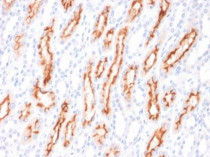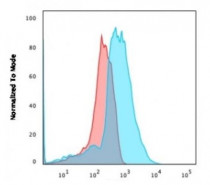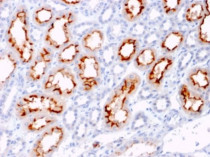ARG43310
anti-CD137L / TNFSF9 antibody [CD137L/1547]
anti-CD137L / TNFSF9 antibody [CD137L/1547] for Flow cytometry,IHC-Formalin-fixed paraffin-embedded sections and Human
Overview
| Product Description | Mouse Monoclonal antibody [CD137L/1547] recognizes CD137L / TNFSF9 |
|---|---|
| Tested Reactivity | Hu |
| Tested Application | FACS, IHC-P |
| Host | Mouse |
| Clonality | Monoclonal |
| Clone | CD137L/1547 |
| Isotype | IgG2a, kappa |
| Target Name | CD137L / TNFSF9 |
| Antigen Species | Human |
| Immunogen | Recombinant full-length Human CD137L / TNFSF9 protein. |
| Conjugation | Un-conjugated |
| Alternate Names | 4-1BBL; 4-1BB ligand; Tumor necrosis factor ligand superfamily member 9; 4-1BB-L; CD137L |
Application Instructions
| Application Suggestion |
|
||||||
|---|---|---|---|---|---|---|---|
| Application Note | IHC-P: Antigen Retrieval: Boil tissue section in 10 mM Tris with 1 mM EDTA (pH 9.0) for 10-20 min, followed by cooling at RT. * The dilutions indicate recommended starting dilutions and the optimal dilutions or concentrations should be determined by the scientist. |
Properties
| Form | Liquid |
|---|---|
| Purification | Purification with Protein G. |
| Buffer | PBS, 0.05% Sodium azide and 0.1 mg/ml BSA. |
| Preservative | 0.05% Sodium azide |
| Stabilizer | 0.1 mg/ml BSA |
| Concentration | 0.2 mg/ml |
| Storage Instruction | For continuous use, store undiluted antibody at 2-8°C for up to a week. For long-term storage, aliquot and store at -20°C or below. Storage in frost free freezers is not recommended. Avoid repeated freeze/thaw cycles. Suggest spin the vial prior to opening. The antibody solution should be gently mixed before use. |
| Note | For laboratory research only, not for drug, diagnostic or other use. |
Bioinformation
| Database Links |
Swiss-port # P41273 Human Tumor necrosis factor ligand superfamily member 9 |
|---|---|
| Gene Symbol | TNFSF9 |
| Gene Full Name | tumor necrosis factor (ligand) superfamily, member 9 |
| Background | The protein encoded by this gene is a cytokine that belongs to the tumor necrosis factor (TNF) ligand family. This transmembrane cytokine is a bidirectional signal transducer that acts as a ligand for TNFRSF9/4-1BB, which is a costimulatory receptor molecule in T lymphocytes. This cytokine and its receptor are involved in the antigen presentation process and in the generation of cytotoxic T cells. The receptor TNFRSF9/4-1BB is absent from resting T lymphocytes but rapidly expressed upon antigenic stimulation. The ligand encoded by this gene, TNFSF9/4-1BBL, has been shown to reactivate anergic T lymphocytes in addition to promoting T lymphocyte proliferation. This cytokine has also been shown to be required for the optimal CD8 responses in CD8 T cells. This cytokine is expressed in carcinoma cell lines, and is thought to be involved in T cell-tumor cell interaction. [provided by RefSeq, Oct 2008] |
| Function | Cytokine that binds to TNFRSF9. Induces the proliferation of activated peripheral blood T-cells. May have a role in activation-induced cell death (AICD). May play a role in cognate interactions between T-cells and B-cells/macrophages. [UniProt] |
| Cellular Localization | Membrane; Single-pass type II membrane protein. [UniProt] |
| Calculated MW | 27 kDa |
Images (3) Click the Picture to Zoom In
-
ARG43310 anti-CD137L / TNFSF9 antibody [CD137L/1547] IHC-P image
Immunohistochemistry: Formalin-fixed and paraffin-embedded Human renal cell carcinoma. Antigen Retrieval: Boil tissue section in 10 mM Tris with 1 mM EDTA (pH 9.0) for 10-20 min, followed by cooling at RT. The tissue section was stained with ARG43310 anti-CD137L / TNFSF9 antibody [CD137L/1547].
-
ARG43310 anti-CD137L / TNFSF9 antibody [CD137L/1547] FACS image
Flow Cytometry: PFA-fixed 293 cells stained with ARG43310 anti-CD137L / TNFSF9 antibody [CD137L/1547] (blue) or isotype control (red).
-
ARG43310 anti-CD137L / TNFSF9 antibody [CD137L/1547] IHC-P image
Immunohistochemistry: Formalin-fixed and paraffin-embedded Human renal cell carcinoma. Antigen Retrieval: Boil tissue section in 10 mM Tris with 1 mM EDTA (pH 9.0) for 10-20 min, followed by cooling at RT. The tissue section was stained with ARG43310 anti-CD137L / TNFSF9 antibody [CD137L/1547].








